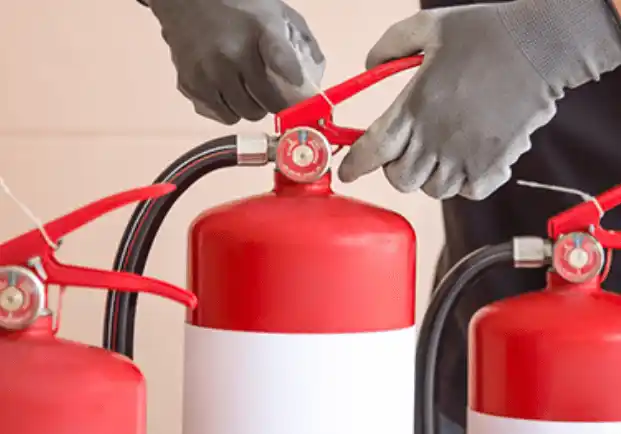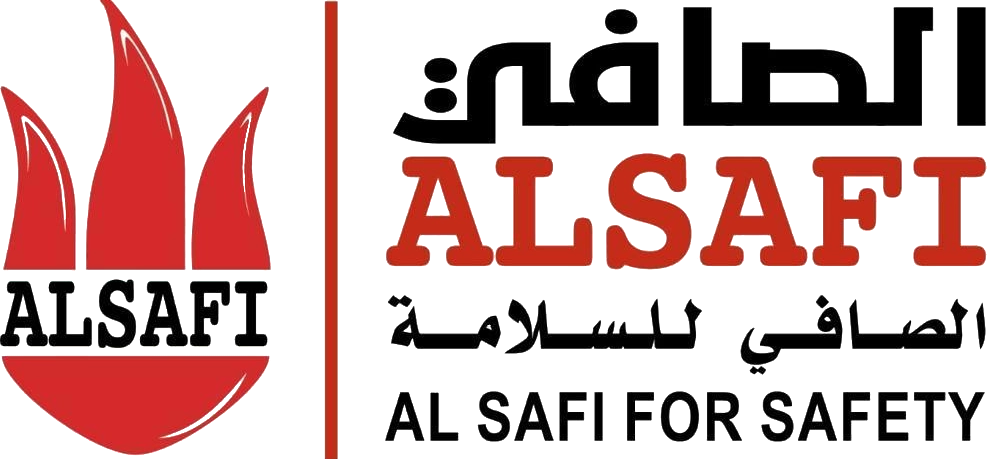صيانة مضخات الحريق – فحص وتشغيل دوري

تُعد مضخات الحريق جزءًا حيويًا من أنظمة الحماية من الحرائق، حيث تضمن توفير الضغط والتدفق اللازمين للمياه في حالة الطوارئ. لضمان عملها بكفاءة وفعالية عند الحاجة، تقدم شركتنا خدمة صيانة مضخات الحريق بأعلى معايير الجودة والاعتماد من الدفاع المدني في المملكة العربية السعودية. نقوم بفحص المضخات واختبار أدائها، ومعالجة أي أعطال لضمان الجاهزية الكاملة وقت الطوارئ. تشمل خدماتنا الصيانة الدورية، الفحص الشهري، واستبدال القطع التالفة، مع توفير تقارير معتمدة. تواصل معنا الآن لضمان نظام إطفاء يعمل بكفاءة وقت الحاجة.
إجراءات الصيانة الدورية
من فوائد عقود الصيانة ان اجهزة الاطفاء تحتاج إلى صيانة دورية مثل مضخات الحريق التي تحتاج إلى صيانة كل حين وآخر؛ للتأكد من عملها بشكل صحيح، وفيما يلي نوضح لك إجراءات الصيانة الدورية لها كالتالي:
الفحص البصري:
- يجب التحقق من عدم وجود تآكل أو تسريبات في المكونات والأنابيب.
- التأكد من نظافة منطقة المضخة وعدم وجود عوائق بها.
اختبار التشغيل:
- تشغيل المضخة بشكل منتظم لفترات قصيرة؛ لضمان جاهزيتها.
- قياس التدفق والضغط للتحقق من الأداء.
صيانة المحرك:
- التحقق من مستوى الزيت وتغييره وقت الحاجة.
- فحص الأسلاك والبطاريات؛ لضمان اتصال جيد، وعدم وجود تآكل.
فحص الصمامات والمحابس:
- التأكد من عمل كل جميع الصمامات بسلاسة.
- تنظيف المحابس والتأكد من عدم وجود أي انسدادات.
التحقق من نظام التحكم:
- فحص لوحة التحكم والتأكد من كونها تعمل بصورة صحيحة.
- اختبار الإشارات وأجهزة الإنذار للتأكد من استجابتها الفورية.
التوثيق:
- الاحتفاظ بسجل كامل لكافة عمليات الإصلاحات والصيانة المجراة على مضخات الحريق؛ إذ يساعد هذا على متابعة حالة المعدات وتحديد المواعيد المستقبلية للصيانة.
الاستعانة بالخبراء:
- الاعتماد على فنيين محترفين للقيام بالصيانة المعقدة والتأكد من سلامة الإجراءات المتبعة للوحات المحركات
اقرأ عن : سعر مضخة حريق 500 جالون
أهمية صيانة مضخات الحريق:
- ضمان الأداء الفعّال: تساهم الصيانة الدورية في الحفاظ على كفاءة مضخات الحريق وضمان عملها بشكل صحيح في حالات الطوارئ.
- منع الأعطال: تساعد الصيانة المنتظمة في اكتشاف المشكلات البسيطة ومعالجتها قبل أن تتفاقم وتؤدي إلى أعطال كبيرة.
- الامتثال للمعايير: تضمن الصيانة الدورية التزام النظام بمعايير الدفاع المدني والقوانين المحلية المتعلقة بسلامة الحرائق.
خطوات صيانة مضخات الحريق الدفاع المدني :
1. الفحص اليومي:
- التأكد من مستوى الزيت: يجب التأكد من أن مستوى الزيت في المضخة وفي المحرك ضمن النطاق المحدد.
- التحقق من ضغط النظام: التأكد من أن ضغط النظام في الحدود المقبولة.
2. الفحص الأسبوعي:
- تشغيل المضخة: يجب تشغيل المضخة لمدة قصيرة للتأكد من أنها تعمل بشكل صحيح دون أي ضجيج غير طبيعي.
- التحقق من الصمامات: التأكد من أن جميع الصمامات تعمل بشكل صحيح ولا توجد تسريبات.
3. الفحص الشهري:
- التأكد من عدم وجود تسريبات: فحص جميع الأجزاء والوصلات للتأكد من عدم وجود تسريبات في النظام.
- فحص البطاريات: التأكد من أن البطاريات في حالة جيدة وتعمل بكفاءة.
4. الفحص السنوي:
- الفحص الشامل للنظام: يجب إجراء فحص شامل للنظام من قبل متخصصين في صيانة مضخات الحريق.
- اختبار الأداء: إجراء اختبار أداء لضمان أن المضخة تستطيع توفير الضغط والتدفق اللازمين.
نصائح لصيانة مضخات الحريق:
- التوثيق: الاحتفاظ بسجلات دقيقة لجميع عمليات الصيانة والإصلاحات التي تُجرى على مضخات الحريق.
- استخدام قطع غيار أصلية: لضمان أفضل أداء وطول عمر للمضخة، يجب استخدام قطع الغيار الأصلية الموصى بها من قبل الشركة المصنعة.
- تدريب العاملين: تدريب الموظفين على إجراءات التشغيل والصيانة الأساسية لضمان جاهزيتهم للتعامل مع أي مشاكل قد تطرأ.
- التعاون مع متخصصين: من الأفضل التعاون مع شركات متخصصة في صيانة مضخات الحريق لضمان الحصول على خدمة عالية الجودة.
كل ما تحتاج لمعرفته عن صيانة مضخات الحريق
- مع تطور التكنولوجيا وزيادة الوعي بأهمية الأمن والسلامة؛ يجب اتباع تقنيات متقدمة ومعايير جديدة لذلك، تشمل تلك المعايير الفحص الدوري لمضخات الحريق، واستخدام أدوات تشخيص جديدة، والتأكد بأن الأنظمة متوافقة مع اللوائح الحالية.
- من المهم كذلك مواكبة أحدث الإبتكارات بمجال المضخات؛ مثل الأنظمة الذكية التي توفر تنبيهات فورية ومراقبة مستمرة لأي خلل محتمل.
- تعد صيانة مضخات الحريق عملية ضرورية وحاسمة لضمان سير اجهزة الاطفاء بشكل جيد، فيجب فحص كل مضخات الحريق وصيانتها بانتظام؛ للتأكد من قدرتها على توفير الضغط والحجم اللازمين للمياه المطلوبة عند حدوث حريق طارئ.
- تعد صيانة مضخات الحريق أيضًا أمرًا هامًا للحفاظ على تشغيل المضخات بكفاءة وأمان، وفي مستوى الأداء الأمثل، ومن المهم كذلك مراقبة أداء مضخة الحريق طيلة دورة حياتها؛ لمنع الأعطال غير المتوقعة وغير ذلك من المشاكل الأخرى التي قد تحدث بسبب عدم صيانة مضخة الحريق الخاص بك.
لذا يوصى وبشدة بخضوع كل مضخات الحريق لفحوصات صيانة دورية على يد موظفين مؤهلين لضمان عملها وأدائها أثناء حالات الطوارئ.
تعرف على أهمية صيانة مضخات الحريق لسلامتك
تُعتبر صيانة مضخات الحريق أمرًا حيويًا لضمان سلامتك وسلامة الممتلكات الخاصة بك، تساعد الصيانة الدورية على الكشف المبكر عن الأعطال؛ وهو ما يمنع حدوث أي توقف مفاجئ بالأنظمة خلال حالات الطوارئ.
وتضمن الصيانة الدورية كذلك عمل المضخات بكفاءة عالية؛ مما يزيد فرص السيطرة على الحرائق بشكل سريع، ويُقلل أي أضرار محتملة.
شركة صيانة وتركيب أنظمة مضخات الحريق
- شركة الصافي هي شركة متخصصة في صيانة وتركيب أنظمة مضخات الحريق، وتقدم خدمات متميزة بمجال تركيب أنظمة الحريق، وتوريد معدات الإطفاء، بما في ذلك أنظمة الإنذار وطفايات الحريق.
- الشركة متخصصة أيضًا في صيانة تركيب مختلف الأنواع من أنظمة الحريق؛ إذ يتم تركيب وتوريد مضخات وطلمبات مياه عالية الجودة، وتعد الشركة كذلك من الشركات الرائدة بمجال الصيانة؛ لأنها تقدم عقود صيانة شاملة تتضمن إصلاح صناديق الإطفاء وأنظمة الإطفاء بشكل دوري.
- تقوم الشركة بتنفيذ أعمال الصيانة والتركيب على يد فنيين معتمدين ومتخصصين، والحرص على تنفيذ هذه الأعمال باستخدام معدات وأجهزة حديثة لضمان الكفاءة، وتوفر الشركة الخدمات الخاصة بها بأسعار مناسبة جدًا؛ لحرصها على توفير أفضل الأسعار لعملائها.
- لضمان حماية الأفراد والممتلكات من أي حريق، توفر الشركة خدمة تركيب وتوريد كافة أنواع أنظمة الإطفاء المدني وأجهزة إنذار الحريق، مع إمكانية الحصول على عقود صيانة تلائم احتياجات العملاء.
ولمزيد من المعلومات، أو لطلب خدمات التركيب والصيانة من الشركة؛ بإمكانك التواصل معنا في شركة الصافي الآن؛ لتضمن حصولك على أفضل الحلول بمجال تركيب أنظمة الحريق وأنظمة السلامة بأعلى جودة وأفضل الأسعار.
اجراءات صيانة مضخات الحريق
تعتبر صيانة مضخات مكافحة الحرائق عمليةً هامة للغاية؛ إذ يجب صيانة هذه المضخات بشكل صحيح؛ لضمان موثوقيتها وفعاليتها بحالة الطوارئ، ولتحقيق ذلك، ينبغي اتباع الإجراءات الصحيحة لصيانة مضخات الحريق، والتي تتضمن الاختبارات المجدولة بشكل منتظم، وعمليات الإصلاح والتفتيش.
كما يُعد ضمان صيانة مضخات الحريق بصورة صحيحة أمرًا بالغ الأهمية لسلامة المبنى ومن بداخله؛ لأنه يحافظ على المضخات في حالة جيدة، فالصيانة الدورية لمضخات الحرائق تعد المفتاح الذي يضمن أن تلك المضخات توفر أداءً موثوقًا عند الحاجة لها أثناء الطوارئ.
تُساعد صيانة مضخات مكافحة الحريق على التقليل من فرص حدوث عطل بها أو فشلها.
افضل شركة صيانة مضخات حريق بالرياض
تُعتبر صيانة مضخات مكافحة الحرائق عملية هامة وضرورية لإنقاذ الأرواح والأصول والممتلكات أثناء طوارئ الحريق، وللتأكد من كون تلك مضخة الحريق جاهزة للاستخدام بأي لحظة.
لذا فمن المهم صيانة مضخات الحريق والعناية بها بالشكل المناسب؛ عن طريق الاستعانة بخدمات واحدة من الشركات المتخصصة في صيانتها في الرياض.
بعد فحص وصيانة مضخات الحريق بانتظام، يمكن للعملاء التأكد بأن المضخات الخاصة بهم ستعمل بأفضل شكل ممكن عند الحاجة.
وتعد شركة الصافي هي أفضل شركة متخصصة في صيانة مضخات حريق بالرياض؛ إذ يتفهم فريقها أهمية وجود مضخات حريق تم صيانتها بشكل جيد، وتسعى الشركة لتلقي العملاء خدمات من الدرجة الأولى عن طريق أجهزتهم المتقدمة.
قائمة فحص صيانة مضخة الحريق
تلعب مضخات الحريق دورًا حيويًا في حماية الأرواح والممتلكات من مخاطر الحريق؛ لذا فإن صيانتها بشكل دوري أمر ضروري لاستمرار تشغيلها في كل الأوقات، وتتضمن عملية صيانتها مجموعة كبيرة من الإجراءات والمهام التي قد تصبح معقدة في حالة عدم تنظيمها بصورة صحيحة.
ولتقليل أي ارتباك والتأكد من إكتمال كل شيء بصورة صحيحة وبالوقت المحدد، ينبغي عمل قائمة فحص صيانة مضخة الحريق، والتي يجب أن تتضمن عناصر مثل: فحص الصمامات، المرشحات، المقاييس، الخراطيم، والمحركات، وغيرهم من المكونات الأخرى للتشغيل السليم.
يجب أيضًا تضمين تدابير وقائية كاختبار كل مضخات الحريق بشكل منتظم للتأكد من عملها بشكل صحيح، يمكن وضع علامة على كل الخطوات اللازمة بثقة؛ وهو ما يعني أن يتم نسيان أي شيء أو التغاضي عنه حين يتعلق الأمر بالسلامة.
كيف تحافظ على مضخات الحريق
لضمان الحفاظ على مضخات الحريق بأفضل حالة، يجب وضع خطة خاصة بالصيانة الدورية، بحيث تشمل كل الجوانب المذكورة.
يجب كذلك تدريب الموظفين على طريقة التعامل مع المضخات، وعلى إجراء الفحوص الأساسية، والاحتفاظ بسجل دقيق لكى عمليات الصيانة والإصلاحات.
تحديات صيانة مضخات الحريق وكيفية التغلب عليها
تشمل تحديات صيانة مضخات الحريق التعرف على الأعطال المحتملة قبل أن تحدث، وضمان التوافق مع اللوائح الجديدة، والتعامل مع قطع الغيار النادرة.
ويمكن التغلب على تلك التحديات عن طريق الاستثمار بالتقنيات الجديدة، وتدريب الفرق الفنية باستمرار، والحفاظ على وجود علاقة جيدة مع الموردين.
مشاكل شائعة في مضخات الحريق وكيفية التعامل معها:
- انخفاض الضغط: قد يكون ناتجًا عن تسريبات في النظام أو مشاكل في الصمامات. يجب فحص النظام بالكامل وإصلاح أي تسريبات.
- عدم بدء التشغيل: قد يكون بسبب مشاكل في المحرك أو البطاريات. يجب فحص البطاريات والتأكد من سلامتها، وكذلك التأكد من عدم وجود مشاكل ميكانيكية في المحرك.
- ضجيج غير طبيعي: يمكن أن يكون علامة على وجود مشكلة ميكانيكية أو تلف في الأجزاء الداخلية. يجب فحص الأجزاء المتحركة واستبدال أي جزء تالف.
تُعتبر صيانة مضخات الحريق عنصرًا أساسيًا في نظام الحماية من الحرائق. من خلال اتباع إجراءات الصيانة الدورية والالتزام بالنصائح المذكورة، يمكن ضمان جاهزية المضخات للعمل بكفاءة عالية عند الحاجة، لذا اذا كنت ترغب في الحصول على مساعدة اطلب خدماتنا الآن من الصافي لأننا نحرص على حماية الأرواح والممتلكات من مخاطر الحرائق.
أسئلة شائعة قد تدور في ذهنك حول صيانة مضخات الحريق
متى يتم صيانة طفاية الحريق؟
يُوصى بفحص طفاية الحريق بشكل شهري؛ للتأكد من سلامة المكونات الخاصة بها، ومرتين سنويًا على يد فني مختص؛ لفحصها وفقًا للمعايير الخاصة بهيئة تنظيم الحرائق المحلية.
كم سنة صلاحية طفاية الحريق؟
غالبًا ما تحدد الشركة المصنعة فترة الصلاحية المتوقعة لطفاية الحريق، والتي يمكن أن تتراوح ما بين 5 حتى 15 سنة، وقد تمتد في بعض الأحيان حتى 20 سنة، وعلى الرغم ذلك، يجب عمل صيانة دورية للطفايات.
كيف اعرف أن طفاية الحريق منتهية؟
لمعرفة ما إذا كانت طفاية الحريق غير صالحة للاستخدام، أو منتهية الصلاحية، يجب النظر بالعديد من المؤشرات والعلامات الدالة على ذلك، حيث يكون تاريخ انتهاء الصلاحية مطبوعًا على طفاية الحريق، وعادةً ما ما يكون موجودًا على العلامة الملصقة في الطفاية نفسها، أو على الأسطوانة، وإذا تم تخطي تاريخ الانتهاء هذا، يجب استبدال الطفاية حينها بطفاية أخرى جديدة.
وكذلك إذا كانت الطفاية قد تعرضت للتلف الميكانيكي، مثل التآكل أو الصدأ في الأسطوانة، أو تلف في الفوهات أو الصمامات، فيجب استبدالها كذلك؛ حيث قد يؤدي التلف الميكانيكي لعدم كفاءة طفاية الحريق عند الحاجة لها؛ مما يجعل الأشخاص والممتلكات عرضةً للخطر عند وقوع حريق.
كيفية فحص طفاية الحريق بشكل صحيح؟
يتم فحص طفاية الحريق للبحث عن أي تلف مادي واضح، أو تسرب أو تآكل أو فوهة مسدودة، ويجب التأكد بأن مقياس الضغط أو المؤشر في الوضع القابل للتشغيل، ورفع المطفأة للتأكد من كونها لازالت ممتلئة، والتأكد بأن تعليمات التشغيل الموجودة فوق لوحة الاسم موجهة للخارج وواضحة.
هل يمكنك صيانة مطفأة الحريق بنفسك؟
نعم يمكن عمل صيانة لطفاية الحريق بنفسك كل شهر؛ للتحقق مما إذا كانت تعمل بحالة جيدة أم لا، وما إذا كان مقياس الضغط يُظهر بأن الضغط كافيًا.







